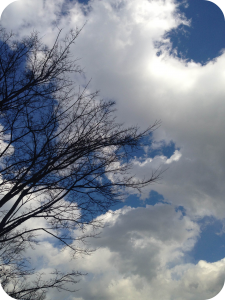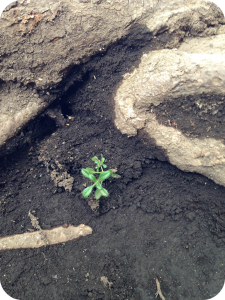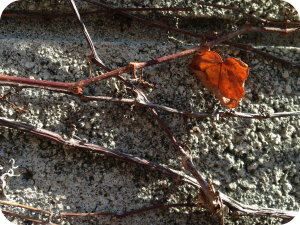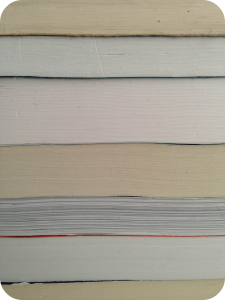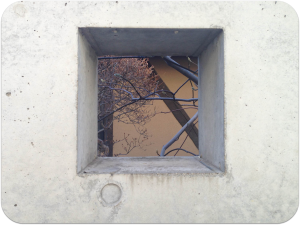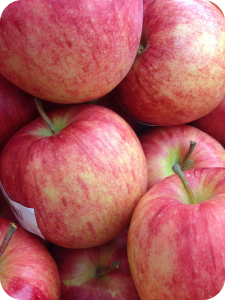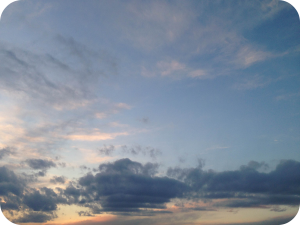Posts Tagged ‘emotions’
Portland, Oregon / Spring, 2002
“How’s this pressure?” I asked, pushing my forearm into the long muscles of Linda’s upper thigh.
“Perfect,” she said, turning her head to the side in the face cradle. “You can continue that way up into my hips.”
Linda was a favorite of mine, as far as regular clients went. She came to me for bodywork about once a week, and we generally chatted amiably throughout our sessions.
After working the tissues in her hips and feeling some release, I began to rock Linda’s pelvis back and forth, letting her body move side to side with its own momentum, waiting for it to come back and meet me before gently pushing again.
This was a move Linda generally enjoyed quite a lot, and I watched her body sway with it, allowing the vibrations running through her to have their effect.
But after a moment her breathing started to catch, quickening and becoming shallow. I heard a sniffle and moved my hand gently to her lower back, letting her body come completely to rest.
“Are you OK?” I asked, moving closer to her head, my hand still on her back.
She turned her face to the side, tears streaming from her eyes. “I don’t know why I’m crying,” she said apologetically.
“It’s OK. Let’s just let it be how it has to be,” I answered. “What can I do for you?”
“A tissue?” she asked, sitting up and gathering the sheet against her as I handed her the box.
Her face was crumpled in a pain that I intuitively knew wasn’t physical. She let her head hang, sobbing, and her body shook in waves.
Sensing that she didn’t need to be touched, I stood back, waiting. At last her body came to rest and a peace fell over the room.
She looked up at me and said, “Do you ever feel …? It’s just that sometimes I get the feeling that nothing is ever enough. That no matter what I do it’s not enough. I just keep going, keep running, keep working, but it’s not enough. Is that crazy?”
“I think that’s a fairly common feeling, actually. Not crazy at all.”
“Is it?” she asked, her face lifting hopefully. “You think lots of people feel that way?”
“Absolutely,” I said. “I do.”
“Well, that’s a relief,” she said, sighing and turning again to rest face-down on the table. “Will you work on my hips again? Just a bit more?”
I continued with the rest of the massage, finishing with my hands gently cradling her head as she lay supine on the table. Her face was smooth and open, her lips curved softly upward.
As she walked out to the front desk, Linda’s gait looked looser, freer. Handing me her check, she grasped my hand and held it for a long moment, looking directly in my eyes. “I just want to thank you,” she said. “That was exactly what I needed.”
“My pleasure,” I smiled.
And it was.
Sunlight streams through the open window next to me, and the early spring breeze carries a fresh, inviting brightness with it. Reluctantly I turn my body back in toward the classroom, where in contrast the light feels paltry, dim, inadequate.
I focus my attention on my notebook, endeavoring to catch up. The professor speaks in his usual engaging way, and the other students are present and alert.
We’re talking about Wittgenstein, and it’s unbearable. I’m not entirely sure why, but my mind feels pressed down upon by the weight of other people’s thoughts. It’s as if I’ve been trying to carry all of them stacked upon one another like thousands of aging, translucent pages–feeble, fragile, no longer alive with relevance.
My gaze drags back to the day outside, to the bright reflectiveness of the soft blades of grass, the buds on each tree branch urging themselves outward. I ache to join it all. My body is nearly in revolt, refusing the reality of the room I’m in, longing to get out.
I notice how the roots of the trees clench the earth, like fingers digging into it, and have to fight the nearly irresistible urge to leave my chair and go kneel out there. Kneel on the slightly damp dirt and dig my hands into it, the way the roots of the trees cling to the earth but are also just part of it, extensions of it. As am I. Just an extension of all that dirt, that grass, those roots, the buds, the branches, the sunshine.
I want to put my hands in it, to feel the texture of the soil, to smell it, to know what it’s like to get my own roots in there. To dirty myself, to be part of it. Part of the day, part of my own life.
It’s almost erotic, this yearning, and I find myself fidgeting in my chair. I want to engage, and not with thoughts or ideas. I want to engage with the dirt of the place where I live. I want to mix with the life that’s in evidence right out there, just feet away from where I sit.
My mind controls me, keeps me in my seat, but I can’t concentrate. My only thoughts are of what my body wants and needs–to get out as soon as possible.
After class, I go lie in the grass, resting my head on the stack of books inside my bag. As overwhelming as the urge had been to be out here, I can’t just kneel and dig my hands in the dirt. What would the people passing by think?
So I lie still, looking up at the sky between the branches of the trees, imagining what I’ll do with my life once I’ve got the degree and am free of the confines and the ideas and the rules and the way things always have to be just so. Free to dig my hands into whatever I want.
Our whole selves are instruments.
Fully engaged–with our minds, bodies and emotions open and functioning–we are instruments perfectly calibrated to sensing the world around us. When we’re in alignment, we effortlessly feel into our world, interact with it, live as a fully integrated part of it.
Because in actuality there’s no way to disconnect our own wholeness from the wholeness of everything. It’s all connected, an infinite and vast web, wholly incomprehensible in scope and yet also somehow astonishingly accessible to us.
What we can do, however, is disconnect from our own wholeness.
When all is functioning well, our interconnection with the world is palpable on a visceral level, and accessible directly through our senses. Our bodies are constantly taking readings on our surroundings, physically noticing what might be dangerous, or what might be enjoyable. Situations are called to our attention through sensations or emotions–fear, anger, interest, attraction.
When our attention isn’t focused on the body’s messages, it can be easy to just let these things pass unnoticed, to miss essential cues that might otherwise save us inconvenience or even injury, or might lead us to a fulfilling experience.
When we ignore this information, as we often do, we shut ourselves off from the wholeness of our lived experience. From an early age we’re taught to let the mind take precedence, to allow it to cut us off from other ways of knowing and interacting. Without us even consciously noticing, the mind directs us to sit still, to wait, to persist, to keep quiet, to do as we’re expected to do.
These are all necessary skills, of course, and important to be able to rely on in certain situations. But they’re not always necessary or called for. We learn to police ourselves diligently and thereby cut off parts of our own experience and knowing that could help us live our lives more fully.
The body and emotions, when listened to, open up whole new vistas that we may have forgotten existed. The experience expands, widens, deepens, and the world becomes not the place we thought we already knew, but something vibrant, mysterious, fascinating. And as we let ourselves notice and engage in this way, we find ourselves guided by an inner knowing that has nothing whatsoever to do with rational thought.
This can lead to simple coincidences–the finding of a thing we’ve been searching for–or it can lead to circumstances much less explicable, much more engaging. It can lead us to new thoughts or ideas, to adventures we’d never otherwise have had, to travels we’d not have dared undertake.
The most beautiful aspect of intuition, perhaps, is the fact that it’s available to all of us, all the time. At any moment your whole self is waiting for you to listen and respond to it. And every time you do, with every action you take in response, the voice of your intuition becomes stronger, bolder, better able to support you.
What’s there right now, waiting to be sensed?
I cross the street from Nørreport Station and step into Fiolstræde, enjoying the light of the early spring morning on my well-worn path to school. A man stands eating a sausage in front of the hot dog wagon. Cyclists roll over still-wet flagstones, and pigeons loiter hopefully in front of the vegetable stand. What was once foreign is familiar now, and dear to me.
Normally I pass the bookstore on the corner with some curiosity, but I almost never go in. There’s a book I’ve had in mind, though; a particular passage in a book, actually. I’ve been fruitlessly searching Copenhagen’s bookstores for it since shortly after I arrived nine months ago, and suddenly feel the urge to try again.
The clerk looks dubious when I tell her the title of the book, but asks for a few minutes to research whether or not they carry it.
I make my way through the Danish titles and settle in the children’s section, where a beautifully illustrated copy of H.C Andersen’s stories lays waiting to be read. Much to my delight, words that would’ve made no sense just months ago unfold into meaning. I’m still engrossed when the clerk approaches, looking apologetic. The book could be imported for me, it seems, but at a steep price. I thank her and step back into the street.
At idle moments throughout the day I try to excavate parts of the passage from my mind, but I know it’s still not right. Frustrated, I go to the school’s library and run an internet search, but turn up nothing.
Late that afternoon on the train home, I try to focus on my reading but end up staring out the window instead. It’s gently raining again, and the clouds hang low in the sky. Drops of water slip down the window, only slightly obscuring the passing scenery. I watch the red-tiled houses, the streets, the cars, the shops. A pair of teenage girls walk arm-in-arm. A mother pushes a large black pram across an intersection. All the while my brain works, trying to tease out a clearer memory of the passage I’ve become stuck on.
Descending the stairs in the station, I pause before turning toward home and instead go in the other direction. I’m not entirely sure why, but I head past the grocery store and the entrance to the shopping center.
My eyes sweep across the square and my attention catches on the glass enclosure of the library’s entryway. I’ve only been in once or twice, but I’m unquestionably drawn to it now. There’s no chance of my book being there, I know, but it’ll be fun to look.
The English section is small, tidy, spare. I peruse the shelves, curious. There’s nothing to surprise me there: Austen, Dickens, Hemingway.
But, suddenly, there–on the second lowest shelf, in a small library in a suburb of Copenhagen–stands the very familiar spine of my much longed-for book.
Right where I’d never hoped to look.
Where’s the fear pointing? At any given moment when you’re feeling fear, where’s it pointing you?
Because fear is always directing us to look somewhere. It asks for our attention. Commands it, even. This is the job of fear, actually, to sense into a situation and respond by directing our attention toward something in particular.
Sometimes it’s directing us to run in the opposite direction, but more often it’s directing us onward into an experience that’s necessary for our own growth.
Since it’s always alert, fear shows us what’s important in any situation. It guides our attention and asks us to examine what’s there. Look a little deeper. Sometimes we have to dig to find an answer, but the answer is there.
It’s a bloodhound that sniffs out what matters, even if it’s not immediately clear to us why it matters. The intensity of its focus can be startling, and for that reason alone we’re tempted to turn away, to ignore it. But fear generally doesn’t take no for an answer, at least not for long. It returns to ask for our attention again and again, if the issue at hand is one that needs noticing.
Fear asks us to investigate and decide on a forthcoming action. This can be simple and immediate, even instinctual. A deer steps in front of your car and you swerve to avoid it; that’s your fear coming to your aid. Not only is this fear normal and healthy, but without it we wouldn’t survive.
The same can be said of the fear that comes to us in other situations. Frequently we respond to fear by avoiding, and thus may not even recognize it for what it is. We may call it procrastination or distraction or resistance, but when we watch ourselves carefully we can feel it arise and catch ourselves as we turn away.
That moment right there is trying to guide our attention toward the very thing we’re turning away from. What’s under that avoidance? What’s behind that? Fear points to it and lets us know that there’s something there worth discovering.
Maybe you’re not painting because there’s a niggling thought that, really, you’re just not good enough. Maybe you’ve been pretending to be fearless for so long that the fear’s had no outlet, and has settled into the kind of gently vibrating anxiety that makes it hard to do even simple things like go to the grocery store. Maybe you can’t let yourself relax into a relationship because underlying your external shell of confidence is the belief that no one could ever really accept all of you.
This is where fear comes in to guide you. When you’re willing to feel it, to listen, to take its wisdom into account, it will point you toward exactly where to look. And it will ask the question, as trustingly and openly as a loyal bloodhound, “Where to now?”
To turn away? To move forward? You get to decide from there.
This shouldn’t be such a big deal. Why does it feel like a big deal?
You fish in your bag, checking for your keys. Still there. Wallet too. It’s okay. Everything’s okay.
It’s mid-morning in grimy, glittering, early-summer Chicago, and you’re alone in the world. Or, at least, alone on your way to the grocery store.
There’ve been so many firsts these last few weeks. First time moving to a city, first time living away from home or the insulated world of your small college, first time looking for a job with no connections whatsoever. And now this: your first time going to a grocery store by yourself. Somehow this is the most intimidating task yet. In some deep and undeniable way, it signifies an ability to take care of yourself. It means you’re one step closer to full adulthood and its attendant weights and responsibilities.
As ridiculous as it seems to you, you’re awash in anxiety, unsure you can do this. And yet you push onward, your stride purposeful, careful to arrange a look of assurance about you.
As you step through the automatic doors of the grocery store, your mood lifts somewhat at the sight of the vivid colors spilling out from the florist’s corner. The frigid air of the produce section is startling and you pull your hands to your upper arms, rubbing your skin to bring yourself some warmth, indulging in a secret half-hug.
Then, approaching a stack of apples, you suddenly realize that you’re not choosing for anyone but yourself. You can have exactly the apples you like. As you walk around collecting items in your basket, the fear that’s been squeezing your stomach begins to relax its grasp.
It’s just a grocery store, after all. In fact, browsing around, choosing carefully, thinking about the meals you might eat–it’s all kind of fun. Exhilarating, even. There’s a power in it, an enjoyment. This is your morning, your day, and you’re making decisions with it. Decisions that will affect your future, if only the future of your meals. Is this what it feels like to be an actual grown-up, driving your own life?
Walking home, you find that your step has a natural power to it; you’re not putting it on. Something has shifted back there amid those stacks of cans and boxes, between the pyramids of produce. You carry the grocery bags with a sense of assurance, one on each arm. This is a thing you can do.
After dark you visit the outdoor pool of the building where you’re staying. Completely alone, you slip into the water, savoring the freedom your body finds there, relishing the sensation of warm air on wet skin. Finally you let yourself come to rest on your back, floating weightlessly and studying all the lights surrounding you: those of the city, those of the sky. The moon’s lifted up high tonight, partial but luminous, far above any of the skyscrapers and incomparably beautiful.
It’s okay. Everything really is okay.
You might as well know the truth: meditation always sort of scared me. There was the stillness and the silence and then the thoughts. All those thoughts that would roil up and ask to be looked at, ask to be seen.
What I didn’t get–the fundamental misunderstanding I brought to meditation–is that the practice is not to quiet the thoughts or make them disappear. The practice is to recognize them, thank them, and let them go at their own pace.
What the monks on Mount Koya may have known that I didn’t is that the thoughts running through our minds are not who we are. We are not those thoughts, but the observers of them. The thoughts themselves pass like clouds in an otherwise clear sky, and the observer remains there, watching.
The clouds simply are. Just as we don’t judge clouds as good or bad, right or wrong, the practice of meditation asks us to treat our thoughts in much the same way. The thoughts that float or skip or tumble into our minds are a part of our humanity, part of our animal selves, and they serve many very important purposes. But they’re not who we are.
Through meditation, we can connect with the true essence of ourselves–that observer–and watch the thoughts do their thing. The more we do this, the easier it becomes to recognize the reality of the situation: that the thoughts are simply thoughts. There’s no need to give them any power, any credence.
And therefore there’s no need to resist them. It doesn’t actually matter much whether they seem to us to fall into the broad categories of positive or negative. They will pass. It’s the resistance of them that causes pain.
So this is something else those peaceful-looking monks may have thoroughly integrated that I had not yet even considered: that all our thoughts and feelings are here to be seen. That’s all they really want. Our fear is that if we stop to look at them, they’ll suck us into some black hole of pain from which we’ll never emerge.
But really they’re just messages to us, here to serve us. Our fear asks us to look inward, our anger teaches us to look at our boundaries, our sadness shows us how to release. They’re beautiful and vital messages from our innermost selves, and they’re here to help. Even the “negative” ones, the scary ones. Sometimes especially those.
When we resist thoughts and feelings, it’s like trying to escape from a Chinese finger trap by pulling hard in opposite directions. Not only does it prevent the ends we have in mind, but it leads to frustration and even mild panic. It’s only when we relax our fingers and push them inward–when we give the thoughts and feelings the attention they need and then let them pass on their way–that we become free. Completely free to relax back into the wholeness of who we really are.
May, 2003
Mount Koya, Japan
I hate this. I fucking hate this.
The thought curled up into my consciousness like a coil of smoke from the incense burning on the dais. The monks leading our meditation practice sat silent, as did everyone else. My thoughts were the loudest things in all existence.
Sitting back on my heels, a position called seiza in Japanese, my legs had already lost all sensation. As unobtrusively as possible, I wiggled myself back and forth. It helped momentarily, but then the tingling deepened, expanded, painfully filling my experience so no other thought could enter.
Opening one eye, I snuck a look at the friend I’d come with. She was sitting in seiza with seemingly effortless ease, breathing deeply, her stomach expanding and contracting with a naturalness I envied.
I’m not supposed to be here. I’m not cut out for this.
It’s not that I’d planned to be there. Having arrived in Japan less than a month earlier, I hadn’t made any plans for the holiday week that straddles the end of April and beginning of May. When my coworker mentioned the trip she was taking to Mount Koya, I’d asked if she minded me tagging along. She’d seemed happy to have a companion, and I’d been thrilled with the trip up to that point.
But somehow, sitting there trying to keep completely still, I felt that everything about the situation was wrong. I wanted to get up and run, twirl, kick, move. Feel my body. Shout. Scream, even, just to feel anything at all.
How much longer?
We’d trundled up there in a very old train, only a few cars long. It’d been charming and beautiful, climbing the mountain that way, watching the towns and villages pass by with their tiled roofs and hilly streets. As we’d climbed it’d gotten colder and colder until, at the very top, the weather was almost winter-like even as spring had fully descended at the mountain’s base.
Upon our arrival, a kindly monk had led us to our small tatami room with a sliding door, two futons stacked on the floor, and a kotatsu, the room’s only heating source. Before dawn the next morning, the same monk had come to get us for meditation practice. Following him along the path tracing the rock garden, I’d been excited to experience sitting in meditation. But the sitting itself felt interminable, unbearable, physically impossible.
What’s wrong with me? I can’t even meditate for half an hour. I suck in every way.
The taunting of my mind was far more painful than the experience in my body. Comparing, complaining, worrying, wondering, my mind mocked me ceaselessly, telling me how bad I was, how stupid. How I’d never be right. How everything I was doing was wrong.
I cracked open my eyes again to surreptitiously study the faces of the monks sitting in front of us, peace saturating their features. What was it they were experiencing? And could I ever find it too?
